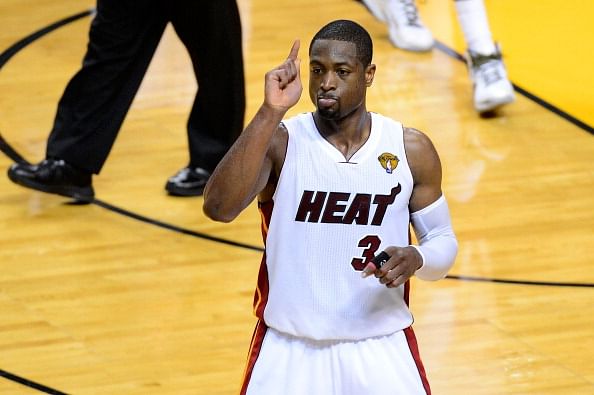
Top 10 Players of the 2000s: #10 Dwyane Wade
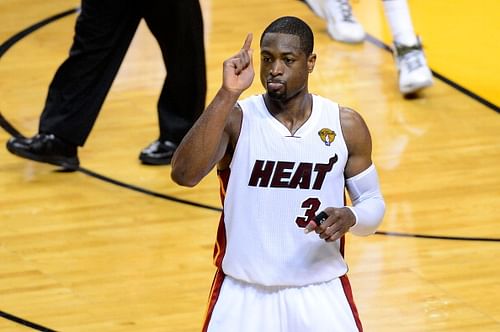
What defines a man? A successful man? A genius? What separates the winners from the also-rans, those who overcome from those who fall just short? What defines a champion? What is the true measure of a man – success or happiness? These are questions that human beings across time and space, irrespective of their differences, ask themselves and often fail to answer. Bookstores abound with tomes claiming this knowledge, domain of both management gurus and lofty philosophers. For me, the truest (and simplest) way to understand a man is in relation with oneself. It is, when good, the most eloquent tribute and when bad, the most genuine criticism. In many ways, Dwyane Wade‘s career in the NBA contains markers to my adolescence as well.
To write about Wade today is also, in a sense, to write with nostalgia; while his contemporaries like James and Melo are in their basketball primes, Wade’s (who turns 31 in January) best years are behind him. While he can still amaze, he does so less often and is no longer driven by the need to be the best, to be #1. He is today a different player – a supporting star in the LeBron James Show – and that saddens the basketball fan in me, because absolutely nothing in the past decade was a greater force in basketball than Dwyane Wade looking to prove himself.
It is what former All-NBA point guard Gary Payton called his “controlled rage”. Wade’s career is marked by certain feats of astonishing brilliance, achievements that confound for even one of Wade’s caliber. At certain moments, he elevates his game to a league of its own; flashes of brilliance that appear only when he’s down and been counted out. There is a fire somewhere, and when stoked, it bursts out and torches everything that impedes it.
Wade’s childhood was a bleak and heartrending affair; till the age of 9, he lived in squalor, dependent on welfare support. His mother, Jolida, was a heroin addict with little time for her kids. His elder sister Tragil provided the comfort and laughter that was otherwise lacking in a crime and gun heavy suburb of Chicago. Wade has, in candid interviews, described the surreality of growing up with the sound of gunfire as an everyday reality in his neighbourhood. Perhaps this is why he is a deeply religious man, his most overt gesture of faith being the construction of a church in his mother’s name. His jersey number – 3 – represents the Holy Trinity. It is tough for me to understand devotion, but when you are a man who goes from welfare to hundreds of millions of dollars and complete security, perhaps then you start to believe.
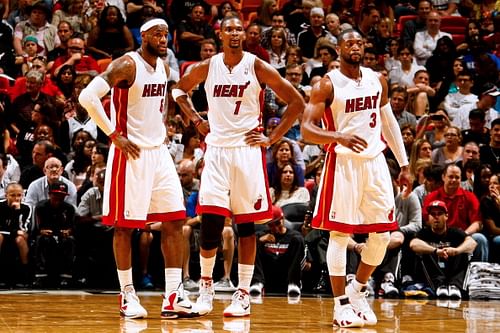
And Wade, quite simply, believes. “If anybody’s going to give you inspiration,” Dwyane wrote to Jolinda, his mother, when she first tried to transform her life, “it’s going to be me. I’m going to show you that you can overcome too.” Jolinda eventually overcame her addictions and now, mother and son have been making up for lost love, the missed school and college basketball games. Meaning is a precious thing in one’s life. The absence of it can destroy both body and soul; its presence can create magic. Perhaps this explains his ‘controlled rage’, a desire to meet the world on his own terms after having ‘overcome’ throughout his entire life. The Pistons at Miami in 2006 is the epitome of this Dwyane, the transcendental basketball force.
In 2006, he led a motley group of veterans to the NBA Championship. That Heat team, however, was not a very good regular season team. At the time of Detroit’s visit, the Heat were 1-7 against division leaders in the NBA, and Pat Riley, their HOF coach, had just called out a veteran team dotted with former NBA greats (Alonzo Mourning, Gary Payton, Antoine Walker) for their insipid play. As a fan of Dwyane Wade, I love it when he underperforms, and love it more when his play is criticized. Because that evokes in him a vengeance, an explosive desire to prove his critics wrong which transforms him. With the Heat down by 7 with 4:30 to go in the 4th against the Conference champions, Wade scored 17 straight points to end the game, including his patented creaky fade-away from 20 feet for the game-winner with 2.3 seconds left. It is for moments like those that we exist as sports fans.
I was 15 back then, and relied solely on the Internet for regular season game videos and play-by-plays. I was also terribly lazy at sports, and despite my height, lethargic and uncommitted on the basketball court. My coach had repeatedly castigated me for (somewhat oddly) not sweating enough on the court. “Look at your captain; that is genuine sweat born out of hard work,” he said repeatedly, if in a overly dramatic manner. The next day, Wade vs Detroit happened. When my exasperated coach said it, it sounded like a liturgical chant. When Wade did it…it astonished. If at all sports has some value in real life, it is in impressing upon some 15 year old kid how to value, how to overcome, how to fight and the will it takes to win.
Wade’s persona and story connected with me deeply. He was overlooked as a top-5 player by most scouts before the 2003 draft. His collegiate play, while exemplary, was still not deemed worthy enough of a high lottery pick and many mock drafts had him ranked in the 8-10 range. The Heat believed and picked him at #5. The history of NBA basketball has been written in New York, Los Angeles, Boston and Chicago. That is the tradition of an NBA fan. But here in India, I knew little of what separated “small-market teams” from “big-market teams”. Basketball, for me, begins with Wade.
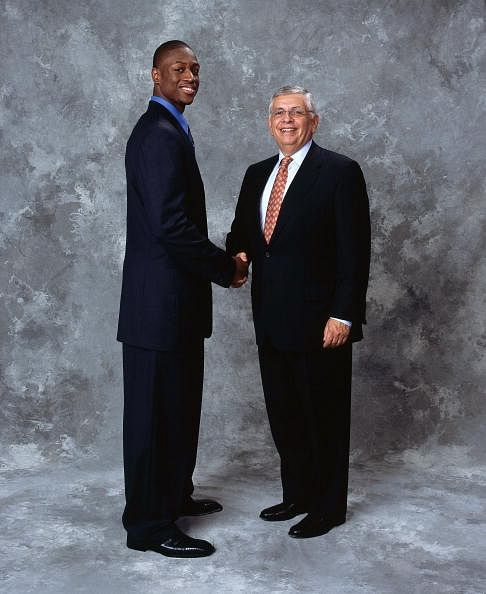
On draft night, he looked overwhelmed; a young kid in a suit too big for him, smiling shyly as the cameras clicked away. He was thin and completely overwhelmed by the moment. LeBron James, the no. 1 pick, was the perfect foil; his greatness had already been foretold with a Sports Illustrated cover story entitled ‘The Chosen One’ a year before. The Cavaliers tanked their way through a season to land him, because talents like James come once a decade. While James and Melo were the media darlings in the early going with incredible resumes in school and college, Wade was the guy who had to play hard till junior year in college to really break out and begin to get noticed. You can’t call a #5 pick an underdog, but compared to James and Melo, he was a nobody.
In his first season, Wade averaged 16 points and 4.5 assists playing point guard for a Cinderella Heat team that finished 42-40 after being rated as a surefire lottery team by the pundits. Everybody loves a Cinderella story, and at 12 years old, I was primed for drama of that sort. India had reached the World Cup finals and lost to schoolyard bullies Australia, I was a thin, bespectacled introvert at school with few friends and here was this guy who was doing crazy things with a team that overachieved beyond everybody’s expectations.
By the end of his rookie season, he was clearly Miami’s best player. In his very first playoff game in his rookie season, Dwyane Wade astonished yet again. The sequence remains my favorite footage of Wade, despite his two championships and despite incredible performance in the latter half of the decade. It was game 1 against the New Orleans Hornets and with 5 seconds to go and scores level, Wade drove to the hoop, pulled up just inside the FT line and drained a jumper for the W. While Bron lounged in his couch in Akron, Dwyane Wade had electrified American Airlines Arena. Can you imagine?
In 2005, after Pat Riley had somehow pulled the NBA’s best Center out of his magician’s hat (as he was wont to do), Wade had his first 20 ppg season, one of several in the decade. The Heat made the Conference Finals and lost to the Pistons in 7 games, with Wade injured for the final two games. The Pistons eventually lost in 7 games in the NBA Finals and Wade had more fuel for his inner fire.
In 2006, he simply would not let the Heat lose. 2-0 down in the NBA Finals, 13 down with 7 minutes to go in Game 3, Dwyane Wade, again astonished, like I knew he would. By then he was a human marvel, larger than all comic book superheroes, my touchstone. “Thirteen points down with six minutes to go? That’s not life or death,” Wade said after the win. “I’ve been through more than anybody knows. To me this is joy. This is when I can let it all out. This is my time.”
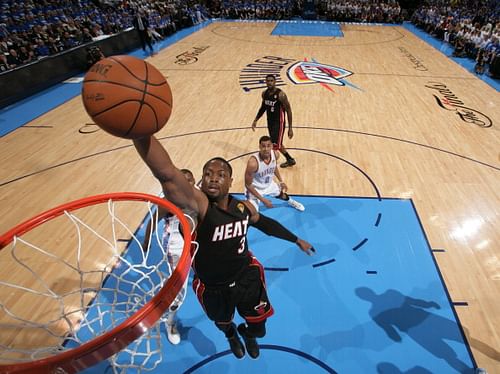
For 2 weeks after the Heat were crowned Champions in the biggest NBA Finals upset of the last decade, Dwyane Wade wore a shirt that read “Any more doubters?” everyday. After surmounting the NBA’s biggest hurdle (in just his 3rd NBA season), it was a fairytale life for Wade. Finally, he got the recognition he deserved. Finally, people were calling him the best in the NBA, a conversation he deserved to be in. But there are more chapters in his story.
“Anybody can be great in life when things are going good,” Wade said in a 2006 interview with SI. “What about when things are going bad?“
In the two seasons subsequent to the 2006 title, Wade’s body failed him. Throughout his career experts questioned whether he could keep up his explosive, contact-heavy, slashing style of play. Wade didn’t just drive to the basket; he got to the hoop literally pushing his opposition out of the way instead of contorting around them. In other words, he flew up into the air, crashed into bodies, miraculously scored the basketball and landed hard on the floor, picking up the and-1. And then his shoulder and knee failed him for two years. The Heat plummeted from the nirvana of championship parades to 15-67, the worst record in the NBA. Pat Riley, one of the top-5 coaches in NBA history, retired in ignominy. After undergoing extensive treatment on his knee, Wade finally returned to full health after the 2007-08 season, though nobody was quite sure how much of his original athleticism remained. Worse, his marriage to high school sweetheart Siohvaughn had crumbled and what followed was a messy divorce suit and legal battle for the custody of his two children, from 2007-09. Siohvaughn had been his bedrock through high school and college; along with his sister, truly family. Sometimes we as fans overlook the personal lives of our heroes in our unflinching demand for their excellence. It wasn’t just a divorce, it was a caustic affair that spilled out into tabloids and ugly accusations.
“Any more doubters?”
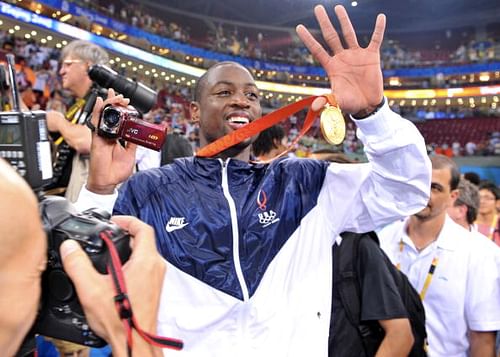
Dwyane Wade was a man on a mission. In the 2008 Olympics, Wade led Team USA in scoring en route to a Gold medal. It’s wasn’t as much what he did as how he did it that had analysts buzzing with excitement. He somehow appeared to be better than he had been pre-injury, which was incredible considering he had been 2006 Finals MVP. He single-handedly carried a Heat team that had Shawn Marion and a rookie Michael Beasley as second and third options, averaging 30 ppg and 7.5 apg. He finished 3rd in MVP voting. The Heat were nowhere near good enough to be in the playoffs, much less win. In 2008 and 2009, despite Wade’s heroics every night, the Heat were knocked out in the first round of the playoffs. Thanks to the internet, these were the years I watched Wade the most. And I’m not sure too many outside Miami did. He was incredible, night in, night out. The NBA tends to privilege playoff moments over regular season greatness, and for good measure. But Wade had some of the most incredible regular season moments in the waning years of the last decade – be it his incredible game-winner in 2OT against Chicago, his 24 point 4th quarter after being elbowed by Danilo Gallinari in 2009, or his incredible (for me) Dunk of the Decade on Anderson Varejao – and he made basketball spectacular. I can safely say that my interest in the NBA would be significantly less had I not connected so deeply with Wade. He represented everything that was great about sports. He was escape from the drudgery of the everyday, he was the uncrowned Superman, he was everything that I was not and wanted to be.
“How are we going to find a way to overcome this?” said Wade in that same interview to SI. “That’s going to decide whether we’re a championship team and whether I’m a good player or great. I love it. It’s my life.”
Yes, Dwyane, I know.